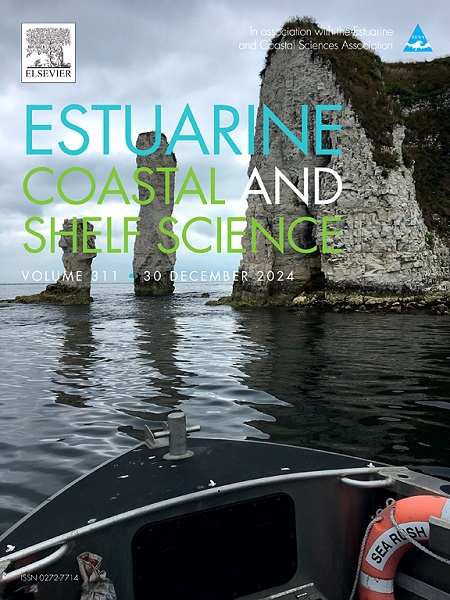确定河口系统潮间带沉积物温度梯度的特征
IF 2.6
3区 地球科学
Q1 MARINE & FRESHWATER BIOLOGY
引用次数: 0
摘要
由于温度会影响海洋生物的生理机能、分布和数量,沿海海洋生态系统正日益受到与气候变化相关的环境变化的威胁,尤其是温度的升高。潮间带软沉积物滩涂上的沉积物温度由于间歇性暴露于空气和海水中,在空间和时间上变化很大。表层沉积物的温度变化可能比深层更大,当地的物理和生物特征以及海洋和大气温度条件预计会影响沉积物栖息动物所经历的温度。然而,有关这些生态系统中沉积物温度的动态变化以及驱动这些变化的当地条件的报道却很少。我们重点测量了河口潮间带沉积物的温度,以描述潮间带大型无脊椎动物(包括底栖动物)所处的环境。对夏季潮间带生态系统沉积物温度的监测显示,沙质潮间带滩涂的温度波动要大于泥质潮间带滩涂。当地的天气条件是潮汐落潮和涨潮时沉积物温度的重要驱动因素,而研究区域的卫星海面温度(SST)数据稀少,与沉积物温度不匹配,这揭示了卫星 SST 在预测近岸区域特定地点潮间带沉积物温度方面的局限性。这项研究表明,需要对大空间尺度和环境梯度的潮间带沉积物温度进行长期监测,以了解和预测气候变化的潜在影响。本文章由计算机程序翻译,如有差异,请以英文原文为准。
Characterising intertidal sediment temperature gradients in estuarine systems
Coastal marine ecosystems are under increasing threat from environmental shifts associated with climate change, particularly increasing temperatures, as temperature influences the physiology, distribution, and abundance of marine organisms. Sediment temperatures on soft sediment intertidal flats are highly variable in space and time due to intermittent exposure to air and seawater. Surface sediment layers may have greater temperature variation relative to deeper layers, and local physical and biological characteristics as well as oceanic and atmospheric temperature conditions are expected to influence the temperatures experienced by sediment dwelling fauna. However, there is little reporting of the dynamics of sediment temperatures in these ecosystems and the local conditions that drive them. We focused on measuring estuarine intertidal sediment temperatures to describe the conditions that resident intertidal macroinvertebrates, including infauna, are being exposed to. Monitoring of sediment temperatures in intertidal ecosystems during summer revealed that sandy intertidal flats had greater temperature fluctuations than muddy intertidal flats. Local weather conditions were important drivers of both low and high tide sediment temperatures, and satellite derived sea surface temperature (SST) data for the study area were sparse and poorly matched sediment temperatures, revealing limitations of satellite SST for predicting site-specific intertidal sediment temperatures in nearshore areas. This study demonstrates the need for long term monitoring of intertidal sediment temperatures across large spatial scales and environmental gradients to understand and predict the potential impacts of climate change.
求助全文
通过发布文献求助,成功后即可免费获取论文全文。
去求助
来源期刊
CiteScore
5.60
自引率
7.10%
发文量
374
审稿时长
9 months
期刊介绍:
Estuarine, Coastal and Shelf Science is an international multidisciplinary journal devoted to the analysis of saline water phenomena ranging from the outer edge of the continental shelf to the upper limits of the tidal zone. The journal provides a unique forum, unifying the multidisciplinary approaches to the study of the oceanography of estuaries, coastal zones, and continental shelf seas. It features original research papers, review papers and short communications treating such disciplines as zoology, botany, geology, sedimentology, physical oceanography.

 求助内容:
求助内容: 应助结果提醒方式:
应助结果提醒方式:


